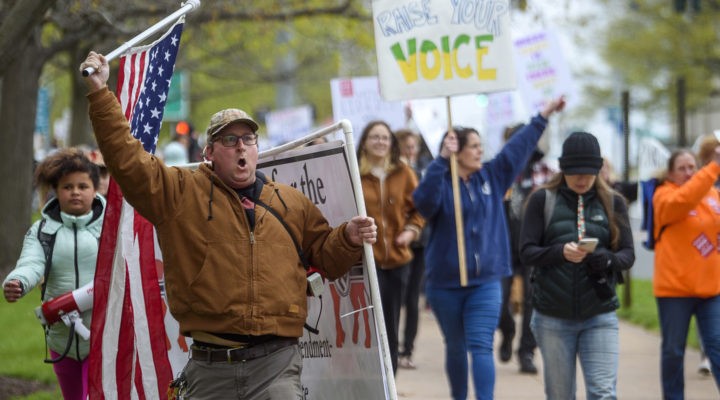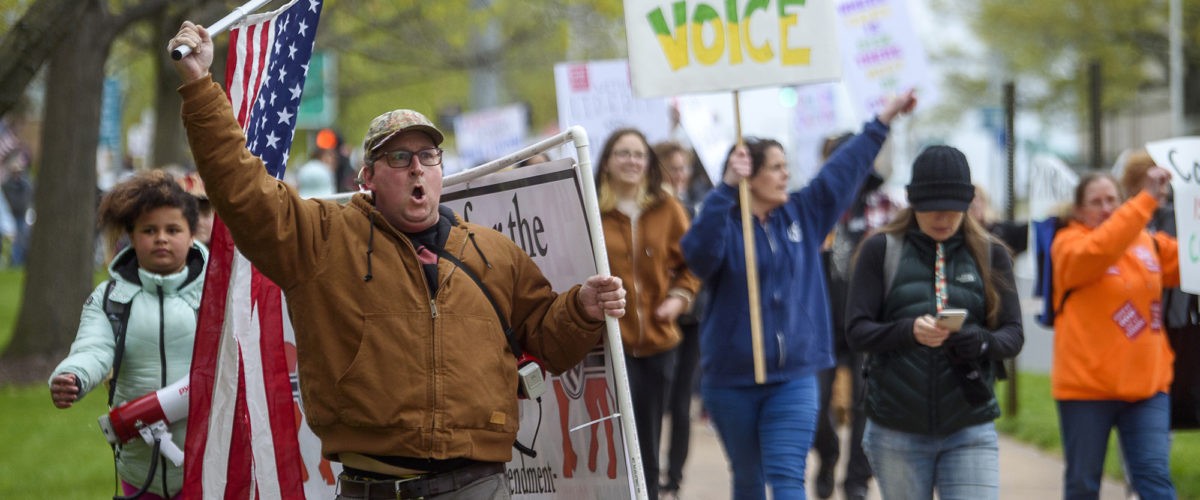As children return to school and adults return to offices this fall amid a severe surge in coronavirus cases, expect to hear more talk about “religious exemptions” to vaccine requirements.
Even before COVID-19, sincerely held religious beliefs have provided a loophole for some anti-vaxxers to avoid protecting their children or themselves against the set of common childhood diseases that have been largely eradicated through persistent global vaccination campaigns — or even against the flu. Experts predict the disinformation and suspicion around COVID-19 vaccines will take requests for religious exemptions to new heights.
The key questions are: What constitutes an authentic religious exemption, and how can schools and employers know what they can legally require? The answers to these questions vary from situation to situation, with schools and workplaces offering different contexts.
“What constitutes an authentic religious exemption, and how can schools and employers know what they can legally require?”
Why this matters
Despite massive campaigns to promote vaccination against COVID-19, a significant percentage of Americans remains vaccine hesitant or vaccine resistant. And even parents who have been vaccinated themselves often are hesitant to have their eligible children vaccinated.
Amid an already contentious cultural life — divided between those who see COVID as an enormous public health threat versus those who think it is a hoax, and between those who advocate vaccine mandates as necessary for the common good versus those who claim individual liberty to resist vaccination — the start of school and the return to workplaces now highlights difference of opinion about mandatory vaccinations.
Those who advocate mandatory vaccination against COVID point to the nation’s history of requiring vaccination against diseases such as mumps, measles, rubella, chickenpox and smallpox. The vaccinations have been highly effective because of herd immunity created by near-universal participation.
One of the primary drivers of this vaccine success story is that every state in the union requires children to be vaccinated before they enter kindergarten. Thus, access to public education has been predicated upon vaccination — unless a parent obtains an exemption for medical or religious reasons.
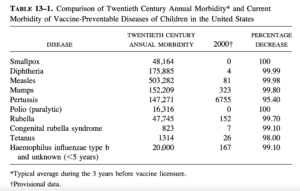 Over the last two decades alone, these immunizations prevented more than 21 million hospitalizations and 732,000 child deaths in the United States, according to the U.S. Centers for Disease Control and Prevention.
Over the last two decades alone, these immunizations prevented more than 21 million hospitalizations and 732,000 child deaths in the United States, according to the U.S. Centers for Disease Control and Prevention.
While no state has yet adopted a COVID vaccine requirement for schoolchildren of any age, there are plenty of voices calling for such policies for children and youth who are old enough to be vaccinated under current guidelines. This would apply mainly to middle school and high school students — as well as to teachers and administrators in schools.
It appears likely that at some point the three vaccines approved for use in the United States will become available to elementary-age children as well, which will extend the debate to the full range of educational institutions.
Where do vaccination schedules and recommendations come from?
Apart from COVID, and long before COVID, the CDC has set the nation’s childhood immunization schedule based on recommendations from its Advisory Committee on Immunization Practices. Those recommendations include the ages when vaccines should be given, the number of doses needed and the amount of time between doses.
However, laws mandating vaccination for schoolchildren are state laws, not federal laws. The first such law was passed in the 1850s in Massachusetts.
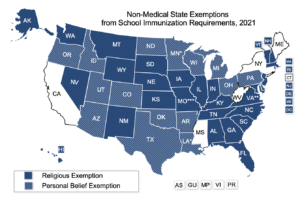 Today, all 50 states have legislation requiring specified vaccines for students, and all 50 states grant exemptions for certain medical reasons. On top of that, 44 states and the District of Columbia grant exemptions to those with religious objections to vaccinations, according to the National Conference of State Legislatures. And 15 states allow exemptions for children whose parents object to immunizations because of personal, moral or other philosophical beliefs. There are five states that grant only medical exemptions: Mississippi, West Virginia, California, New York and Maine.
Today, all 50 states have legislation requiring specified vaccines for students, and all 50 states grant exemptions for certain medical reasons. On top of that, 44 states and the District of Columbia grant exemptions to those with religious objections to vaccinations, according to the National Conference of State Legislatures. And 15 states allow exemptions for children whose parents object to immunizations because of personal, moral or other philosophical beliefs. There are five states that grant only medical exemptions: Mississippi, West Virginia, California, New York and Maine.
To reach the necessary level of herd immunity against these now-eradicated childhood illnesses, the CDC recommends a kindergarten vaccine coverage rate of 95% or above for the measles, mumps and rubella vaccine. NCSL reported that the average rate for the 2018-2019 school year was 94.7%, ranging by state from 87.4% to 96.1%.
“These efforts support achieving herd or community immunity, which refers to a population that has achieved immunity at a high enough level to make the spread of the virus unlikely,” the NCSL explained. “This protects those individuals who cannot receive a vaccination because they are too young or due to medical reasons. According to the CDC, most states could attain 95% immunization coverage if they could identify children without vaccinations, or who have not completed the full dose of the vaccine, and also do not have an exemption.”
Thus, the more exemptions granted, the harder it becomes to achieve herd immunity.
What Americans think about exemptions
While most Americans alive today have no memory of the ravages visited upon children by polio or smallpox or measles, they do have evidence of the deadly effects of COVID-19. Yet even with such first-hand knowledge, the push for religious exemptions to vaccine mandates appears to be stronger than ever.
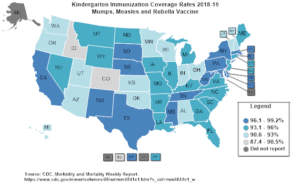 New nationwide polling by Public Religion Research Institute finds that 42% of Americans believe children should be allowed to attend public school without receiving required vaccines if they have religious objections. On the other hand, 57% do not support religiously based vaccine exemptions.
New nationwide polling by Public Religion Research Institute finds that 42% of Americans believe children should be allowed to attend public school without receiving required vaccines if they have religious objections. On the other hand, 57% do not support religiously based vaccine exemptions.
PRRI explains: “These percentages have shifted considerably since January 2021, when more than one in four Americans (27%) supported religiously based vaccine refusals and nearly three in four Americans (73%) opposed such exemptions. Parents with children under the age of 18 are notably more likely than non-parents to support religiously based vaccine refusals in public schools (50% vs. 39%).”
Following the general pattern of attitudes toward COVID, Republicans are more likely to support religiously based vaccine refusals for public schoolchildren than are independents and Democrats. A majority of Republicans (58%) support such refusals, while 41% of independents and only 29% of Democrats favor them.
Those percentages increase in all three political groups, however, when narrowed only to the perspective of parents.
Again following the pattern of religious identification most often tied to political affiliation in the current culture, white evangelical protestants (63%) and Mormons (59%) lead the pack on saying children should be able to attend public school without required vaccines on religious grounds. Jewish Americans and the religiously unaffiliated are least likely to support religious exemptions from vaccination.
What is a religious exemption?
The curious thing about religious exemptions to vaccinations is that there is no standard definition of what constitutes such an exemption. In most states, there is no definition at all.
Texas is the most populous state that allows for religious exemptions to vaccination. There, parents who wish to claim religious exemptions to vaccinations for their children simply submit an affidavit to the proper state office. There are no criteria to meet; it is a self-proving affidavit. The same is true in Georgia and several other states.
“In most states, there is no definition at all.”
In North Carolina, parents are required to give a written statement about why their religious beliefs conflict with vaccination requirements. The same is true in Oklahoma and several other states. But again, no criteria are given that must be met.
Thus, when it comes to COVID vaccines, if there ever comes a time when they are required for a state’s schoolchildren, religious conservatives who have been the most vocal COVID deniers would only have to say they object and would have no standard of reasoning to meet.
A huge loophole
These state laws also typically apply to colleges and universities. That — along with workplace exemptions — is where the dean of the University of California Berkeley law school believes religious exemptions are a loophole without end. Erwin Chemerinsky wrote about this in a July 23 opinion piece for the LA Times.
“Policies requiring vaccination against COVID-19 need not include, and should not include, exceptions for those who have religious objections to vaccinations,” he wrote. “Many universities, including the University of California, are requiring vaccination for all students, staff and faculty returning to campus. Many employers, public and private, are doing so as well. These policies are essential to protect public health. The virulent Delta variant of the coronavirus has made it imperative to ensure vaccination of as many people as possible.”
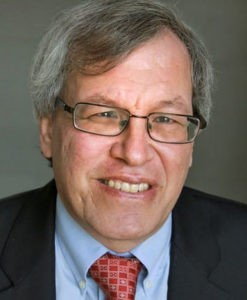
Erwin Chemerinsky
Chemerinsky argues that when it comes to universities — where virtually everyone involved is legally an adult — there is no legal standing to require religious exemptions. And he believes they are so ambiguous as to be dangerous.
“These are neither required by the law nor are they desirable as a matter of policy because they make it possible for anyone to circumvent the vaccine mandate,” he wrote.
He cited U.S. Supreme Court precedent in key cases, including Employment Division v. Smith and Fulton v. City of Philadelphia, as well as Trans World Airlines v. Hardison to assert that there is no First Amendment or religious liberty exemption created for vaccine mandates. That’s because vaccine mandates are neutral laws that apply to all people equally and do not discriminate against people because of their religious views.
“Laws that require vaccination are the epitome of a neutral law of general applicability: a requirement that applies to everyone and that was not motivated by a desire to interfere with religion,” he wrote. “Even if this were not so, the government can infringe on religious freedom if its action is necessary to achieve a compelling interest.
“Stopping the spread of a deadly communicable disease is obviously a compelling interest, and vaccinations are the best way to reach that goal. No one, in practicing his or her religion, has a constitutional right to endanger others.”
And as further evidence of the legality of his position, he cited the example of the five states that offer no religious exemptions for schoolchildren and vaccinations. “Without exception, the lower courts have upheld these mandates as constitutional,” he reported.
“Without exception, the lower courts have upheld these mandates as constitutional.”
Chemerinsky then turned the argument to cover not only universities but also workplaces: “Universities and employers have the legal right to make sure that everyone is vaccinated. And they have the moral duty to protect health and lives.”
Where employers stand
When it comes to the workplace, the legal rights of employers to require vaccination appear to be much clearer than the situation with schoolchildren.
The Society for Human Resource Management has a page on its website devoted to this question. It notes that the Equal Employment Opportunity Commission has published guidance that says federal anti-discrimination laws don’t prohibit employers from requiring all employees who physically enter the workplace to be vaccinated for COVID-19. “Employers that encourage or require vaccinations, however, must comply with the Americans with Disabilities Act, Title VII of the Civil Rights Act of 1964 and other workplace laws.”
That’s where religious exemptions come in for employers.
Title VII requires an employer to accommodate an employee’s sincerely held religious belief, practice or observance, unless it would cause an “undue hardship” on the business. Courts previously have said an “undue hardship” is created by an accommodation that has more than a de minimis (very small) cost or burden on the employer.
Possible accommodations could include not requiring the unvaccinated employee to physically enter the workplace, if that is possible with the employee’s type of work.
The EEOC’s website includes a full discussion of this issue.
Unlike the invisible requirements to prove a religious belief in most public schools, employers are able to hold employees to a higher standard.
Unlike the invisible requirements to prove a religious belief in most public schools, employers are able to hold employees to a higher standard, according to a description published by the Prinz Law Firm of Chicago.
“As part of their religious beliefs, many individuals object to vaccines. Employers are required to accommodate religious observances and practices, unless doing so imposes an undue hardship on the business. … If an employer can establish that the employee is seeking an exemption for non-religious reasons, the employer may deny the employee’s request.”
An example of this occurred in 2017, when a federal circuit court ruled in Fallon v. Mercy Catholic Medical Center that an employee’s request for exemption from a flu vaccine mandate was not religious in nature but was about possible side effects of the flu vaccine, meaning the objection was medical rather than religious.
Related articles:
A pediatrician’s advice to parents worried about the COVID vaccine and their children
Francis Collins: ‘Give God the glory’ for vaccines ‘but roll up your sleeve’
6 things you should know about the COVID vaccine | Opinion by Christy Edwards and Jen Dilts

